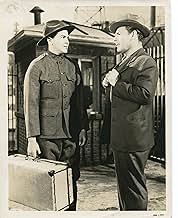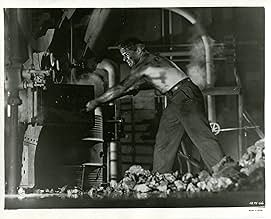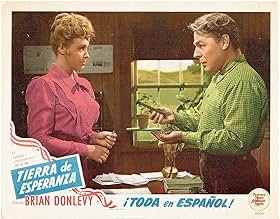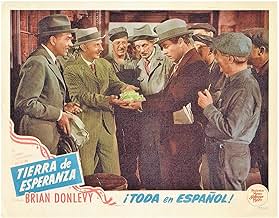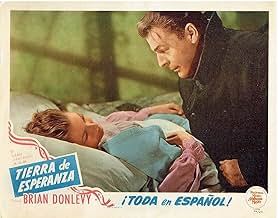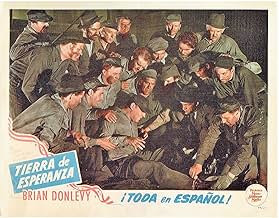VALUTAZIONE IMDb
6,7/10
641
LA TUA VALUTAZIONE
Aggiungi una trama nella tua linguaStefan Dangos, an immigrant, starts working in iron mines and steel mills. Through hard work, he rises through the ranks, eventually becoming a successful American industrialist.Stefan Dangos, an immigrant, starts working in iron mines and steel mills. Through hard work, he rises through the ranks, eventually becoming a successful American industrialist.Stefan Dangos, an immigrant, starts working in iron mines and steel mills. Through hard work, he rises through the ranks, eventually becoming a successful American industrialist.
- Regia
- Sceneggiatura
- Star
- Premi
- 2 vittorie totali
Stephen McNally
- Teddy Roosevelt Dangos
- (as Horace McNally)
- …
Ernie Adams
- Man and Dog Act
- (non citato nei titoli originali)
Erville Alderson
- Olson - Detroit Auto Works Technician
- (non citato nei titoli originali)
Fred Aldrich
- Assembly Line Worker
- (non citato nei titoli originali)
Axel Anderson
- Immigrant
- (non citato nei titoli originali)
King Baggot
- Graduation Ceremony Attendee
- (non citato nei titoli originali)
Charles Bates
- Teddy Roosevelt Dangos - Age 8
- (non citato nei titoli originali)
Barbara Bedford
- Hospitable Farm Woman
- (non citato nei titoli originali)
Arthur Belasco
- Drowsy Miner
- (non citato nei titoli originali)
Leon Belasco
- Cigar Store Proprietor
- (non citato nei titoli originali)
Art Berry Sr.
- Customs Man
- (non citato nei titoli originali)
Anna Marie Biggs
- Girl Soprano
- (non citato nei titoli originali)
Recensioni in evidenza
I saw this movie as a kid of 10 in Port Arthur, Texas, which had four theaters in a four block area. I don't remember all the details, but it was definitely a feel-good film. The protagonist was an Eastern European immigrant whose name was long and hard to pronounce, so he was re-christened Steve Dangos. Steve first got a job iron ore in an "op'm pit". Being bright and ambitious, he later became an automobile manufacturer and, if the movie is to be believed, was the first to build an enclosed sedan. He was proud to be an American (this was at a point in World War II when the outcome was expected but not guaranteed) and he named his sons after Washington and Theodore Roosevelt. He had his share of sorrow when one of the sons was killed in World War I. This was not one of the all-time film classics, but it must have made a great impression on me for the basic plot to have stayed with me for all these 62 years.
"An American Romance" from 1944 is partly propaganda and partly about immigrants who came to this country and went for the American dream. Originally, the stars were to be Spencer Tracy and Ingrid Bergman instead of Brian Donlevy and Ann Richards, which would have made it seem like a much bigger film. King Vidor thought he had an agreement that Tracy and Bergman would star; apparently MGM heard something else. As it is, the film is done in color and had a good budget.
The version I saw is 121 minutes; originally the film was 150 minutes and the studio ordered 30 minutes cut. There are long scenes of factory work as iron, steel, cars, and airplanes are produced, and Vidor thought the 30 minutes would come from those scenes, which are wonderful but plentiful. Instead dramatic portions were cut. The film ends abruptly.
Need I add, this was the last film King Vidor did for MGM.
The story concerns a Czech, Stefan Dangos, who emigrates to America, intending to get a job in the iron mines with his cousin. That happens, and he works his way up, along the way marrying his English tutor (Ann Richards). He graduates to steel, and finally goes into business making cars.
This is truly a story about achieving the American dream, with a lot of patriotism thrown in, as the film spans from the 1890s into World War II and America's entry into it.
The factory scenes and the scenes in the iron mines are fascinating. Of note, during World War II, there were no passenger car assembly lines in operation. As a result, Vidor had to borrow cars from Chrysler, take them apart, and reassemble them in a simulated assembly line.
Brian Donlevy, who usually plays the heavy, does a fine job here. He's no Spencer Tracy, but I liked him in the role. He's rough around the edges and very believable and likable. Ann Richards is lovely as his wife - I assume if Ingrid Bergman had done this role, it would have been built up quite a bit. Stephen McNally and Walter Abel are also featured; McNally, as one of Stefan's son, is the narrator.
Good, not great, but certainly an interesting film.
The version I saw is 121 minutes; originally the film was 150 minutes and the studio ordered 30 minutes cut. There are long scenes of factory work as iron, steel, cars, and airplanes are produced, and Vidor thought the 30 minutes would come from those scenes, which are wonderful but plentiful. Instead dramatic portions were cut. The film ends abruptly.
Need I add, this was the last film King Vidor did for MGM.
The story concerns a Czech, Stefan Dangos, who emigrates to America, intending to get a job in the iron mines with his cousin. That happens, and he works his way up, along the way marrying his English tutor (Ann Richards). He graduates to steel, and finally goes into business making cars.
This is truly a story about achieving the American dream, with a lot of patriotism thrown in, as the film spans from the 1890s into World War II and America's entry into it.
The factory scenes and the scenes in the iron mines are fascinating. Of note, during World War II, there were no passenger car assembly lines in operation. As a result, Vidor had to borrow cars from Chrysler, take them apart, and reassemble them in a simulated assembly line.
Brian Donlevy, who usually plays the heavy, does a fine job here. He's no Spencer Tracy, but I liked him in the role. He's rough around the edges and very believable and likable. Ann Richards is lovely as his wife - I assume if Ingrid Bergman had done this role, it would have been built up quite a bit. Stephen McNally and Walter Abel are also featured; McNally, as one of Stefan's son, is the narrator.
Good, not great, but certainly an interesting film.
Brian Donlevy stars as an immigrant who comes to America in the late 19th century and rises through hard work to become a success.
This film was written, produced, and directed by the great King Vidor at MGM and was meant to be an American industrial epic culminating in a WW II propaganda piece with bombers flying in formation. It was also supposed to be the story of an immigrant and his family. The film was screened at 150 minutes, and Louis B. Mayer demanded the film cut down to 120 minutes. Vidor has no part in the edit, so what remains is a choppy story with lots of documentary-like scenes of industry. Most of the family story got deleted.
Initially set up at MGM to star Spencer Tracy, Ingrid Bergman, and Joseph Cotten, by the time Vidor was ready to film, Mayer balked at the cost and proceeded with a B cast of Brian Donlevy, Ann Richards, and Walter Abel. John Qualen and Stephen McNally are the only other name actors in the cast.
Saddled with a B cast, Vidor still tried to make the film he envisioned, but there are far too many cost-saving things going on, especially the cheesy sets. While there are some location shots, these are pretty much confined to industrial scenes.
The real pity is that Donlevy gives a terrific performance as does Abel in a much-reduced part. Australian-born Richards, however, is pretty bad, and her accent seems to change in every scene. With the family stuff omitted by Mayer, the narrative is choppy and the "heart" of the film is gone.
It's no surprise that after this bowdlerized version was released in 1944, it was a major flop. MGM lost a bundle and Vidor never worked for the studio again.
This film was written, produced, and directed by the great King Vidor at MGM and was meant to be an American industrial epic culminating in a WW II propaganda piece with bombers flying in formation. It was also supposed to be the story of an immigrant and his family. The film was screened at 150 minutes, and Louis B. Mayer demanded the film cut down to 120 minutes. Vidor has no part in the edit, so what remains is a choppy story with lots of documentary-like scenes of industry. Most of the family story got deleted.
Initially set up at MGM to star Spencer Tracy, Ingrid Bergman, and Joseph Cotten, by the time Vidor was ready to film, Mayer balked at the cost and proceeded with a B cast of Brian Donlevy, Ann Richards, and Walter Abel. John Qualen and Stephen McNally are the only other name actors in the cast.
Saddled with a B cast, Vidor still tried to make the film he envisioned, but there are far too many cost-saving things going on, especially the cheesy sets. While there are some location shots, these are pretty much confined to industrial scenes.
The real pity is that Donlevy gives a terrific performance as does Abel in a much-reduced part. Australian-born Richards, however, is pretty bad, and her accent seems to change in every scene. With the family stuff omitted by Mayer, the narrative is choppy and the "heart" of the film is gone.
It's no surprise that after this bowdlerized version was released in 1944, it was a major flop. MGM lost a bundle and Vidor never worked for the studio again.
I saw this movie as a nine year old child and never forgot it. Later it appeared on television and more recently on TCM. I was impressed by the hero's fortitude in walking to Minnesota to join his cousin at the Mesabe Iron Range, his hard work, and his learning to read and eventually marrying the teacher. Each of his male children was named for a president after a friend remarked their child might reach that office. The movie taught me how iron ore was shipped east and processed into steel. Dangos also moves east and becomes a foreman. He eventually becomes an automobile manufacturer and his new ideas bring him success. His children succeed by achieving through the benefits of education. The movie ends after a documentary of American industry's contribution to the war effort. The Technicolor was gorgeous and Donlevy's performance believable. I still enjoy watching this film and believe King Vidor put his heart into it.
"An American Romance" is the sort of film that was the perfect film for the perfect time. It is chock full of unabashed patriotism and is a bit schmaltzy--all in the midst of WWII. So, this sort of gung-ho worked well then but probably would be seen by many today as dated. However, I think that compared to many such films of the era, this one actually holds up well and is worth seeing today, as there is excellent acting and a bit of a history lesson here we could enjoy.
The film begins with Stefan Dubechek aka Steve Dangos (Brian Donlevy) arriving in America. He knows no English but like any good citizen, has a strong desire to work hard and make something of himself. So, starting off at the bottom at a steel mill, he is able to work his way up through the company. Eventually, he and a new friend find they have a great idea for a new car--and soon leave to start a company of their own.
The film is basically the American success story. Of course not every guy with vision and drive makes it--but this film seems to indicate that such an individual will. And, it also stresses the importance of such a strong-minded and committed person to the new war effort, as the film ends with Dangos organizing his factory for the mass production of aircraft.
While this could have been a dry documentary-type film, little bits of humanity and charm make this film work well. Well worth seeing.
By the way, if you do watch, pay attention to Donlevy's accent. Especially towards the end, he forgot it in a scene or two and in the next he's speaking with this strong accent once again!
The film begins with Stefan Dubechek aka Steve Dangos (Brian Donlevy) arriving in America. He knows no English but like any good citizen, has a strong desire to work hard and make something of himself. So, starting off at the bottom at a steel mill, he is able to work his way up through the company. Eventually, he and a new friend find they have a great idea for a new car--and soon leave to start a company of their own.
The film is basically the American success story. Of course not every guy with vision and drive makes it--but this film seems to indicate that such an individual will. And, it also stresses the importance of such a strong-minded and committed person to the new war effort, as the film ends with Dangos organizing his factory for the mass production of aircraft.
While this could have been a dry documentary-type film, little bits of humanity and charm make this film work well. Well worth seeing.
By the way, if you do watch, pay attention to Donlevy's accent. Especially towards the end, he forgot it in a scene or two and in the next he's speaking with this strong accent once again!
Lo sapevi?
- QuizDuring World War II, there were no passenger car assembly lines in operation. As a result, Vidor had to borrow cars from Chrysler, take them apart and re-assemble them in a simulated assembly line. Seen emerging from the factory are 1942 Plymouths with a Danton insignia and hubcaps. These were the last passenger cars manufactured by Chrysler before the World War II shutdown.
- BlooperAs Steve Dangos closes his front door (after arriving home from the board meeting), a hand and lower arm can also be seen closing the door from the outside.
- Versioni alternativeOriginal version premiered at 151 minutes; later cut to 122 minutes.
- Colonne sonoreAmerica, My Country Tis of Thee
(1832) (uncredited)
Music by Lowell Mason, based on the Music by Henry Carey from "God Save the King" (1744)
Played during the opening credits
Reprised at the end
I più visti
Accedi per valutare e creare un elenco di titoli salvati per ottenere consigli personalizzati
Dettagli
Botteghino
- Budget
- 3.000.000 USD (previsto)
- Tempo di esecuzione
- 2h 31min(151 min)
- Proporzioni
- 1.37 : 1
Contribuisci a questa pagina
Suggerisci una modifica o aggiungi i contenuti mancanti

